News
Govt. to amend Act as sand mining sans licence meets legal roadblock
The Government’s decision to allow sand transport without any need for a licence has been temporarily put on hold as it has been deemed a violation of the provisions of the Mines and Minerals Act.
The existing provisions on sand transport had been lifted by a special Cabinet decision taken under a directive of President Mahinda Rajapaksa allowing sand transport without a licence. Accordingly sand transport was allowed only during between 6 a.m. and 6 p.m. and subsequently it was further relaxed allowing sand transport even during the night. However the Government issued this order only in the form of a Cabinet paper without amending the Mines and Minerals Act which governs sand mining and transport.
 These images show the River bank damage to the Mahaweli River near Wasgomuwa National Park.. Sand Mining has been witnessed every 25 metres over a stretch of 30 kilometres. |
 |
Under Section 28 of this Act, no sand transport is allowed without a valid licence issued by the Geological Survey and Mines Bureau (GSMB). Following the release of the Cabinet paper, the GSMB stopped issuing sand transport licences, which however, was in violation of the Mines and Minerals Act.
After bringing this irregularity to the notice of the Supreme Court by Environmental Foundation Limited (EFL), the Supreme Court issued directives to the GSMB to re-issue transport licences for sand as required by law and ordered the Police to enforce the law accordingly. Ordering the GSMB to give publicity to the decision taken to re-issue transport licences, the Supreme Court had taken a firm position on this issue.
The GSMB confirmed that sand transport permits are reissued now. But the Sunday Times has also learned that under another Cabinet decision, the GSMB is compelled to prepare papers to amend the Mines and Minerals Act to facilitate cancellation of sand transport licences.
Sand mining on river banks has many environmental impacts and on its realization sand mining has been regulated by the Mines and Minerals Act in 1992. But illegally mined sand continues to come into the market. With the intention of closing the loop holes and providing a monitoring mechanism on sand transportation, the law has been amended in 2004 making it mandatory to get a permit to transport sand. This permit is being issued to the sand mining party and is also linked to its mining licence. For example, if the mining party is allowed to mine only 35 cubes of sand, the transport permit too is being issued only for that quantity. The licence also contains information on the location these sands are mined at providing a good monitoring mechanism to stop illegal mining.
But now, after a lorry carrying sand reaches the main road, there is difficulty monitoring if any of these conditions have been adhered to. So it is feared the cancellation of sand transport licences would fuel illegal sand mining.
The licence also states the weight of sand one lorry load could carry. Some bunds of tanks specify the maximum weight they can hold, so it is learnt that before issuing these transport permits the GSMB’s regional offices evaluate road conditions and this helped to protect river banks and tank bunds from over-weighted lorries which travel on them.
But the Government’s stance on this issue has been different. Making a statement in Parliament on the Cabinet decision on cancellation of sand transport licences, Environmental Minister Anura Priyadarshana Yapa pointed out that issue of sand transport licences has led to high prices for sand. He said this has been a burden on the construction industry.
At the Cabinet meeting on May 9 the President had therefore ordered sand transport without a licence be allowed, the minister said.
He also said that to ease inconvenience to the public the right to issue sand transport licences for non-commercial uses was delegated to the Provincial Secretaries in January 2012 also allowing sand transport from a building material store to the construction site sans licence. However even this has not helped to reduce the price of sand, which led to taking the decision to do away with licences. The minister has called the present laws only lead to irregularities and corruption.
However, a sand transport licence costs only about Rs.100, so environmentalists question how the cancellation of licences could increase prices. It has been stated that the police stop the sand transporting lorries and take bribes from the drivers, pushing up prices automatically.
It has also been stated that immediately the sand transportation law was revoked sand prices had come down drastically. The only logical explanation is that illegally mined sand had come into the market.
This is also evident from the report published in the Sunday Times of June 3 where Mahaweli ‘C’zone legal sand miners association secretary S. Kahathuduwa said the purchase of sand from legal miners had rapidly declined due to the low price of sand sold by illegal sand miners. Talking to our regional reporter, he said previously three cubes of sand could be sold for Rs. 10,000 but now it is difficult to sell three cubes for even Rs. 6,500.
Veteran environmental lawyer Jagath Gunawardane said the Government should not take this kind of ad-hoc decision. He said it was a bad precedent and the repercussions of removing laws might have severe consequences in the future. Within the last few weeks laws aimed at controlling environmental impacts have been relaxed.
This includes allowing use of heavy machinery for gem mining in over two acres of land and doing away with permits for transporting wooden furniture. Justifying these actions, Minister Yapa said laws and regulations should be amended if they cause inconvenience to the people. However, most of these laws are there to deter damage to the environment by providing a mechanism to monitor illegal activities. The environmental destruction caused by uncontrolled sand and gem mining could boomerang, in the long term, making more people suffer than those who benefit by relaxing of these laws.
Mining of sand, for instance, affects not only the riverine environment alone but also reflects on the coastal ecosystem especially by way of coastal erosion and salinity intrusion.
comments powered by Disqus





















